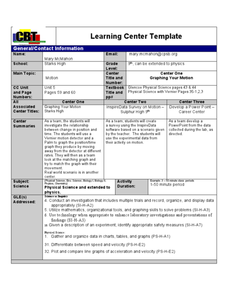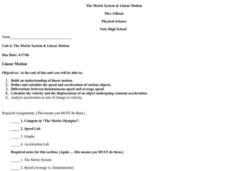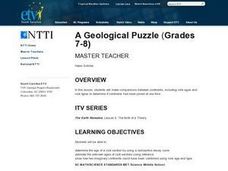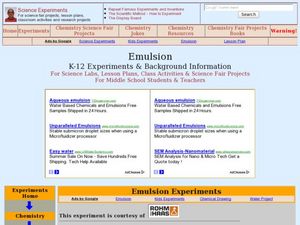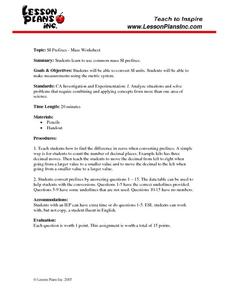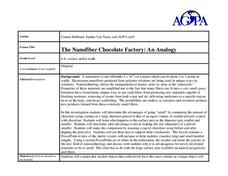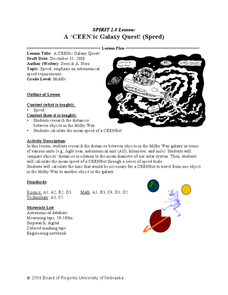K12 Reader
Measuring Temperature
Fahrenheit? Celsius? What's the difference, and where did these two temperature scales originate? Your pupils will learn all about these topics by reading the passage included here. After reading, individuals respond to five questions...
Curated OER
LEGO Balance
Students design and build a balance using LEGO, string, and a set of standard metric weights.
Curated OER
"Graphing Your Motion"
Students study the concepts of motion, velocity, and acceleration through graphing their own movement using LoggerPro. They explain the difference between speed and velocity using the weather vane example. They discover the difference...
Curated OER
"Measurement in Motion"
Ninth graders examine the rate of motion and changes in motion using a ramp and a rolling object. They conduct the demonstration, determine the average speed, and describe how a moving object can have zero acceleration and deceleration.
Curated OER
Linear Motion
Students are able to build an understanding of linear motion. They are able to define and calculate the speed and acceleration of various objects. Students are able to differentiate betweeen instantaneous speed and average speed. They...
Curated OER
A Geological Puzzle
Young scholars compare and contrast the various types of rocks on each continent. In groups, the calculate the rock ages and types to determine if the continents, in their opinion, were joined at one time. They develop two imaginary...
Curated OER
Physics and Me
Sixth graders compare and contrast mass and weight. For this physics lesson, 6th graders calculate speed given distance and time information. They construct a rocket and relate this to Newton's 3rd Law of motion.
Curated OER
Newton's Laws
Young scholars identify Sir Isaac Newton and his contribution to physics. They write Newton's three Laws of classical mechanics. and apply Newton's Laws to the world around them. They isolate a situation and apply Newton's Laws.
Curated OER
What Influences Reaction Rate?
Learners study reaction rates, what determines how fast a reaction happens and how the chemical changes occur. In this reactions lesson students complete a lab where they use Alka-Seltzer to observe reaction rate and create a graph with...
Curated OER
Emulsions
Students identify the characteristics and composition of emulsions. In this chemistry lesson, students classify household products according to emulsion type. They explain how to make the best emulsion.
Curated OER
Dinosaur Tracks: From Stride To Leg Length To Speed
Students determine the relationship between leg length, stride length, and speed in humans and bipedal dinosaurs. They collect data and graph these human characteristics then use actual data collected from dinosaur track pads and fossils...
Curated OER
SI Prefixes and Mass
In this SI prefixes and mass worksheet, students are given measurements of mass and they covert to the given measurement by moving the decimal the proper number of places to the left or right.
Curated OER
The Nanofiber Chocolate Factory: An Analogy
Students investigate Nanotechnology. In this physic's lesson, students evaluate a hands-on model made from chocolate syrup and pretzels to determine the advantages of size. Students weigh chocolate syrup to determine it's wait in grams,...
Curated OER
Human Fingerprints: No Two the Same
Sixth graders explore scientific observations by analyzing a group of data. In this fingerprint identification activity, 6th graders identify the reasoning behind fingerprinting and create their own ink fingerprints. Students discuss the...
Curated OER
Temperature (Celsius)
Third graders solve Celsius and Fahrenheit conversion problems, watch weather forecast and convert temperatures to Celsius, and design and present their own weather forecasts for different regions based on information gathered from...
Curated OER
Phase Change
Students compare the freezing temperature of two substances by conducting an experiment to freeze liquid ice cream. They vary the amount of salt used in the ice cubes during the freezing procedure to determine the change in the...
Curated OER
Linear Motion 6
In this linear motion learning exercise, students answer 12 questions about acceleration, velocity and distance traveled. They interpret diagrams and indicate the location of an object if it has positive, negative or no acceleration....
Curated OER
Graphing Toad/ Frog Respiration
Students measure respiratory rates on live toads, and the effect water temperature has on their findings. In this scientific method lesson, students record their findings and present them in a graph, comparing the results.
Curated OER
High Temperature records by State
In this temperatures worksheet, students view a spreadsheet of the high temperatures of the states and change the data on it using spreadsheet tools. Students complete 4 tasks.
Curated OER
Time to lend NASA a hand
In this measurement worksheet, students complete an experiment answer questions about how they measure the units of volume, temperature, and mass of certain objects. Students answer 5 questions.
Curated OER
What Can You Learn From A Mealworm?
Students collect data from mealworms. For this science and math lesson plan, students gain an understanding of collecting metric data using mealworms.
Pleasanton Unified School District
Temperature Review Worksheet
Young scientists examine how temperature is measured in both Fahrenheit and Celsius in a box in a weather science worksheet. They write equivalent temperatures in four examples and write the temperatures shown on four thermometers at the...
Curated OER
Telemetry
In this telemetry worksheet, students will read about how telemetry works and the different ways that scientist use telemetry to gather data. Students complete 2 short answer questions based on the reading.
Curated OER
A CEENic Galaxy Quest!
Students research the distances between objects in the Milky Way. In this astronomy lesson, students calculate the time it would take for a robot to travel from Milky Way object to another. They create a travel package for customers...




